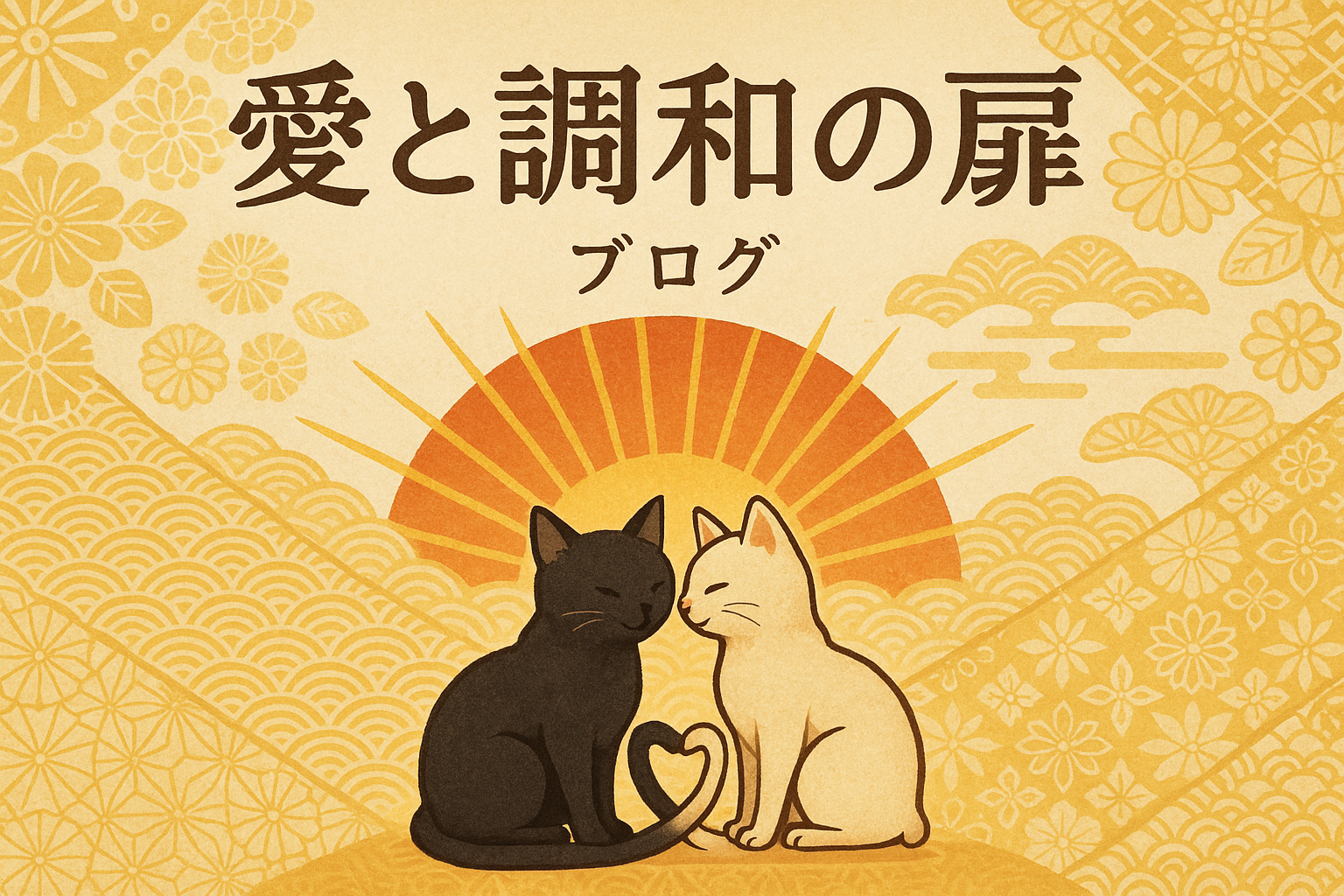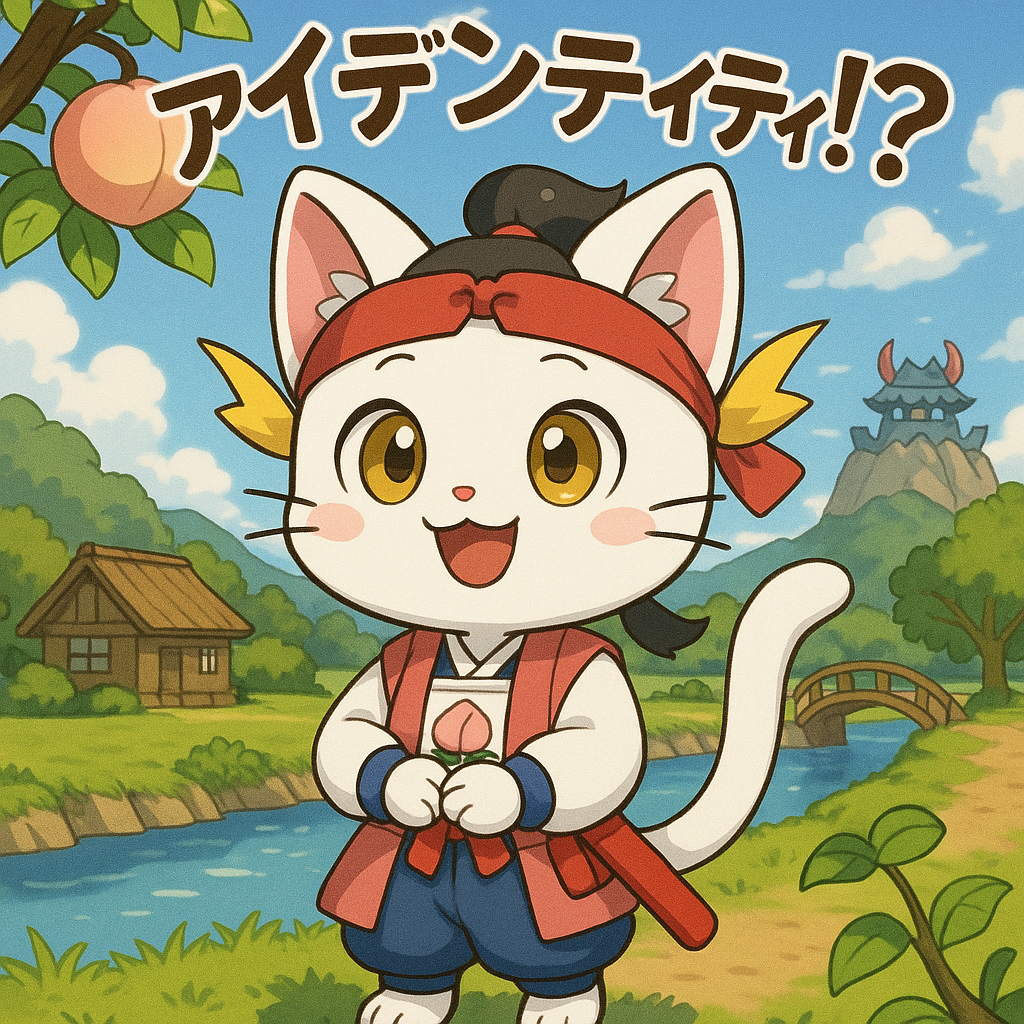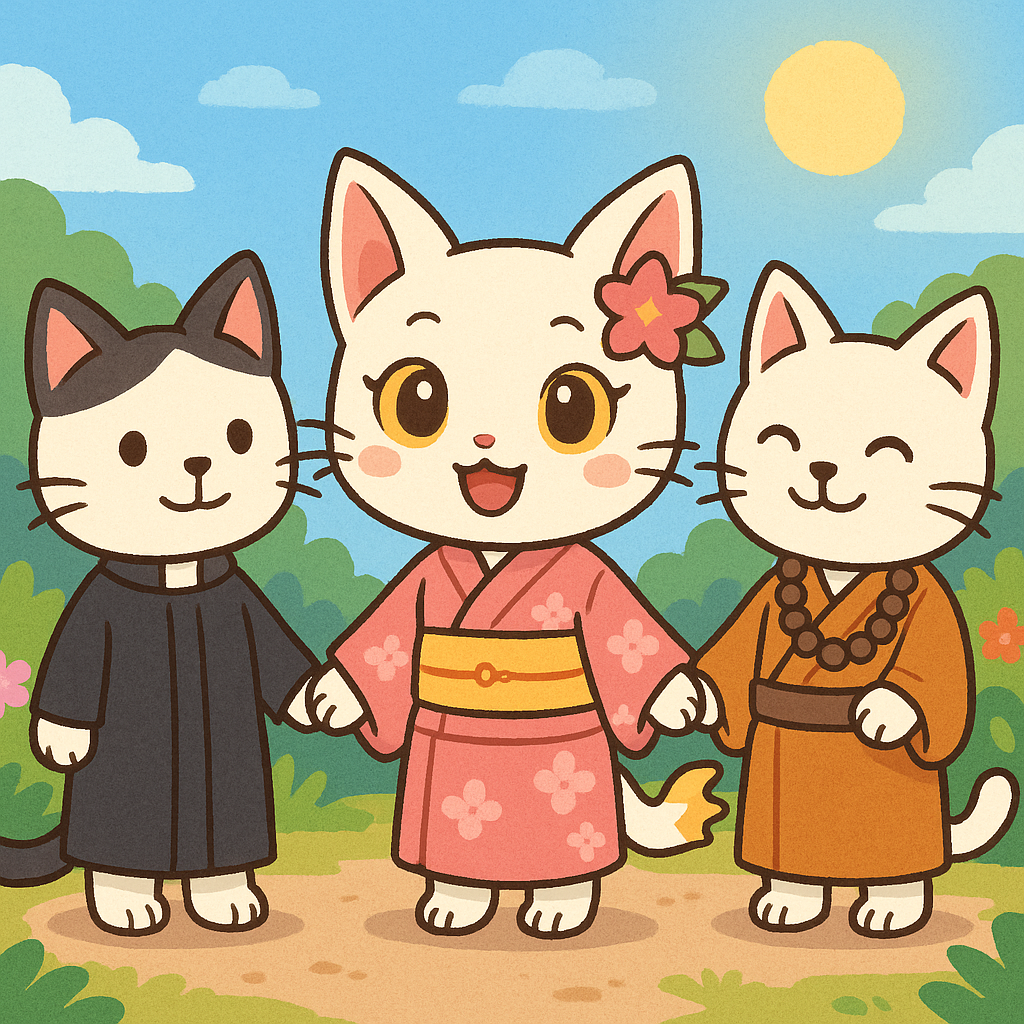[2025 Latest] How to overcome the modern identity crisis with flexibility | Learning from Momotaro how to live a flexible life
- Why is the word "identity" so popular these days?
- table of contents
- The modern identity crisis
- The Light and Shadow of Identity
- The Japanese solution: flexibility
- Flexibility required in the age of AI
- Practical Advice on Flexibility
- Caution and balance
- Real-world examples of flexible use
- The value of flexibility in a global society
- The psychological benefits of flexibility
- Applications in Education
- Flexibility in the future society
- Rediscovering a culture that was once sealed away and our choices
- Summary: Freedom from Identity
Why is the word "identity" so popular these days?
Recently, I have seen many situations where people are using the word "identity" excessively in an attempt to assert their individuality.
In social media posts, discussions at work, political statements, teaching in the classroom...in every situation,identity" The word is flying around.
But do we really understand what this means and use it accordingly?
I've been feeling this kind of doubt lately.
🤔 Does this scene seem familiar?
- At a meeting: "It goes against my identity."End the discussion
- On social media: While posting, "Let's value our identity,"Attacking others
- During job hunting: I was instructed to clarify my identity.Confused students
- In education: "Respect individual identity"Provide uniform instruction
So, this concept of "identity",Does it really enrich our lives?
Or are we just creating new conflicts and confusion?
The journey to find the answer to this question is the subject of this article.
"who are you?" -Can you answer this question immediately?
Job hunting, social media, globalization...modern society is constantly questioning our identity.
However, the ancient JapaneseFlexible" may offer a new solution to this modern problem.
table of contents
- The modern identity crisis
- The Light and Shadow of Identity
- The Japanese solution: flexibility
- Flexibility required in the age of AI
- Practical Advice on Flexibility
- Caution and balance
The modern identity crisis
Is Momotaro the same story every time?
"Once upon a time, there was a place..."
When you hear this opening, what kind of Momotaro do you think of?
In fact, the story of Momotaro changes depending on the person telling it, the person listening, and the atmosphere of the situation.
This is the essence of the traditional Japanese way of life, "flexibility.".
The modern mantra: "Who are you?"
In modern society, we are alwaysself definitionis being asked
- "What are your strengths?" in job hunting
- The need for self-expression on social media
- Reassessing Cultural Identity through Globalization
- Redefining "humanness" in the age of AI
📢 Note: The concept of "identity" is actually a relatively new invention, originating with the 18th century thinker Rousseau..
In the long history of humankind, this way of thinking is rather unusual..
The Light and Shadow of Identity
The positive side of identity
✅ Deepening self-understanding
- Recognizing your own values and behavioral patterns
- A clue to the direction of your life
- The basis for psychological stability
✅ Respect for diversity
- Understanding the positions and backgrounds of others
- A starting point for a dialogue: "This is what I think, what do you think?"
- Foundations for building an inclusive society
✅ Necessity in the international community
- Self-introduction in intercultural exchange
- "As a Japanese person" Opinion Statement
- Differentiation in Global Business
The dangerous side of identity
⚠️ The trap of fixation
"I'm a science major, so I'm not good at literature" "I'm an introvert, so I'm not suited to sales"
The risk of being tied down to a fixed identity and closing off new possibilities.
⚠️ The poison of exclusivity
There is a danger that this will create an "us" vs. "them" conflict structure, which will become a breeding ground for discrimination and violence..
Many of history's ethnic conflicts have arisen from this obsession with "pure identity.".
⚠️ Forced self-regulation
The pressure to "answer" questions during job hunting and on social media can cause you to lose sight of your true self.
The Japanese solution: flexibility
What is flexibility?
Flexible and unrestricted
- Flexible: Blending and communicating, working freely
- Unobstructed: Freedom of movement and freedom
- Overall meaning:Being able to respond flexibly to situations without being too attached to things
*A concept derived from the Buddhist Avatamsaka Sutra, based on the idea that all things are interconnected and that there is no fixed reality..
An example of flexibility rooted in Japanese culture
🗣️ Honorific system
The same "eat"Depending on the person you are talking to, you can use "taberu," "taberumasu," "itadakimasu," or "meshiageru."
Changing the "linguistic self" according to the situation.
🌸 The aesthetics of space
The moon hidden behind clouds is more beautiful than a full moon. The sensibility to find beauty in something slightly imperfect, rather than perfect.
A spirit that is not bound by fixed "perfection".
👥 Culture of reading the air
Advanced social skills that allow you to sense the mood of a situation and adjust your behavior accordingly.
In the West, this is often criticized as a lack of initiative, but in fact it is a sign of flexibility..
Flexibility required in the age of AI
Why flexibility is important now
1. Accelerating technological change
Occupations such as YouTuber, data scientist, and UX designer that didn't exist 10 years ago are now commonplace.
Static expertise alone cannot keep up with change.
2. Differentiation between AI and humans
AI surpasses humans in logical thinking and memory,Flexibility, creativity and empathy in response to changing situationsis an area where humans excel.Flexibility is the essence of being human.
3. The global superiority of Japanese culture
One of the reasons why Japanese anime and manga are loved around the world isA complex portrayal of human beings that does not simply divide them into good and evil.
This is also a sign of a flexible and open-minded spirit..
"Strength through the absence of ideology"
An interesting point: Japan does not have a solid religious or ideological foundation.This allows us to flexibly adopt new technologies and cultures.
- Astro Boy: Coexistence of humans and robots
- Doraemon: Friendship between AI and humans
- Gundam: Human and AI collaboration
Compared to the "human vs. AI" conflict in Western works, Japan depicts "coexistence" in a natural way.
This may be a flexible idea that is not bound by fixed notions of "humanity.".
Practical Advice on Flexibility
1. Think of identity as a verb
| fixed mindset (noun) | Flexible thinking (verb) |
|---|---|
| I am an introvert | I act introverted now, but I can be extroverted when needed. |
| I am a science person. | I often use scientific thinking, but I can also utilize liberal arts sensibilities. |
| I'm the leader type | They may take on leadership roles, but can also contribute as followers. |
2. Having multiple identities
📊 Example of Yamada, an office worker
- Weekday Morning: Efficiency-oriented business people
- weekend: Creative DIY enthusiasts
- With family: A kind father
- With friends:A humorous mood maker
All of them are "the real Yamada-san".I am simply expressing myself in a way that is appropriate to the situation..
3. Balance between "form" and "change"
Structural analysis of Momotaro
📚 Basic Types (Immutable Elements)
- Born from a peach
- grow up
- Going out to exterminate demons
- Gather your allies
- Defeat the demon
- Bring home the treasure
🎭 Changing elements
- Narration style (gentle/interesting/instructive)
- Emphasis (adventure/friendship/courage)
- Tailored to your audience
You are the same. Maintaining basic values (patterns) while flexibly changing the way you express yourself and respond - this is the practice of flexibility..
Caution and balance
The pitfalls of inflexibility
⚠️ 1. The dangers of pleasing everyone
If you try to please everyone too much, you will lose credibility.
Maintain basic values and ethicsIt is important to change the way you express yourself.
⚠️ 2. Distinguishing between indecisiveness and indecisiveness
Flexibility is not the same as indecisiveness.
Ability to read a situation and make appropriate decisionsAnd it's not a lack of determination.
⚠️ 3. Maintaining autonomy
It is important to read the atmosphere, but there is no point in completely suppressing your own opinion.
"This is what I think, what about you?"It is important to maintain this dialogue.
Modern use guidelines
🎯 Three principles for practice
1. Be flexible while maintaining principles
- Maintaining core values
- The methods and means of expression change depending on the situation
2. A constant desire to learn
- Reassess your stereotypes regularly
- Open to new information
- See failure as an opportunity for growth
3. Have diverse perspectives
- Don't get hung up on one right answer
- Put yourself in someone else's shoes
- Have multiple solutions
Real-world examples of flexible use
Practice in business situations
📈 Salesperson Sato's success story
Mr. Sato is a top sales employee. He is actually quite shy, but he expresses himself differently depending on who he is talking to.
🏃♂️ President of Company A (sports-oriented)
→ A lively and proactive character
📊 Company B's manager (cautious)
→ Take a data-driven, analytical approach
👔 Section manager at Company C (older male)
→ Be polite and modest
This is not a people pleaser.You are simply expressing different aspects of yourself depending on who you are talking to.
A new approach to job hunting
💼 Flexible answers to "Who are you?"
"I am someone who can provide optimal value depending on the situation. When teamwork is required, I function as a team player. When individual focus is required, I function as a craftsman. When creativity is required, I function as a creator. My strength is being able to respond flexibly without being bound by a fixed 'personality.'"
The value of flexibility in a global society
Responding to cultural diversity
In today's global society, collaboration with people from different cultural backgrounds is essential.
An open-minded mindset is a powerful tool for dealing with this diversity.
- American ColleaguesDirect and open communication
- German PartnerA logical and systematic approach
- Korean Clients: Polite service that emphasizes relationships
- Indian Engineer: A preference for deep technical discussions
Self-expression in the digital age
📱Flexibility in the SNS era
In today's world, it is common to express different identities across multiple platforms.
[Adaptability is more important than consistency
LinkedIn: Professional self-expression
Instagram: Emotional expression through visuals and lifestyle
Twitter: Intellectual discussion and current affairs
TikTok: Creative and playful expression
Modern communication skills are about expressing different sides of yourself according to the characteristics of each platform..
The psychological benefits of flexibility
Stress reduction effect
🧘♀️ The value of psychological flexibility
- Freedom from perfectionism: Free yourself from the fixed idea of "how things should be"
- Increased adaptabilityReduces anxiety and fear of change
- Improve interpersonal relationships: Be able to respond appropriately to different people
- Increased creativity: It enables you to think outside the box
Strengthening resilience
A flexible mindset is a great way to deal with difficult situations.Boost your resilienceIt works
🌪️ Examples of crisis response
- When unemployed: Transitioning from "Sales Me" to "Freelance Me"
- When I'm sick: Transition from "active me" to "reflective me"
- Changes in family structure: Adapting from "single me" to "parent me"
Applications in Education
How to teach your child to be flexible
🎓 How to practice at home and school
1. Providing a variety of experiences
- Create opportunities to experience a variety of fields, including sports, arts, and learning.
- Encourage continuous challenges without making assumptions about what you're good at or not good at
- Creating an environment where failure is seen as a learning opportunity
2. Learning to respond to situations
- How to behave appropriately with family, friends, and teachers
- Differences between public and private behavior
- Developing the habit of thinking from the other person's point of view
3. Formation of a core of values
- Clarifying core values that will not change
- Establishing ethics and morals
- Cultivating the habit of asking "why"
Flexibility in the future society
Coexistence with technology
🤖 Humanity in the Age of AI and Robots
As technology advances, the skills required of humans are also changing.
Areas where AI excels
- Data processing and analysis
- Pattern Recognition
- logical thinking
- Repetitive tasks
Areas where humans excel (flexible use)
- Understanding and adapting to context
- Creativity and intuition
- Empathy and interpersonal relationships
- Value judgments and ethical thinking
Contributing to a sustainable society
🌱 Application to environmental and social issues
A multifaceted and flexible approach is essential to solving increasingly complex social problems.
- environmental issues: Flexible thinking to balance the economy and the environment
- Low birthrate and aging population: Ability to understand and bridge differences in values between generations
- Promoting diversity: Coexistence of people with different backgrounds
- Work Style Reform: Realizing flexible working arrangements according to individual circumstances
Rediscovering a culture that was once sealed away and our choices
Stolen words, rewritten historical truth
Today is an interesting time!
for a long timeThe words that were stolen,History has been rewritten,Cultures and customs that have been sealed awaySecrets such as these are being revealed one after another.
"Flexible" might be one of them.
As Western individualism and identity theory become mainstream, the traditional Japanese wisdom of flexible living has sometimes been overlooked as being "lacking in subjectivity" and "vague and illogical."‼
A time of choice for us living in the modern age
We live in modern times and have the right to choose.
🤔 Questions we must face
- The original meaning of the word:What is the original richness of the Japanese language that is hidden behind imported concepts?
- How to deal with different cultures:How do we accept and digest values that have come from the West?
- Cultural Identity: What to keep and what to change in the face of globalization?
- Passing on to the future:What will we leave for the next generation, and what will we create anew?
Balancing intercultural understanding and cultural ownership
The important thing is,Neither blind rejection nor uncritical acceptance, a mature cultural dialogue.
🌍 A constructive intercultural approach
1. Deep understanding
Intercultural concepts (identity, etc.)Background and contextUnderstand.
Learn why the concept was created and what social need existed.
2. Rediscovering Your Own Culture
Traditional Japanese concepts (e.g., flexibility, etc.)Original value and contemporary significanceReevaluate.
Understand that what's old isn't necessarily outdated.
3. Creative synthesis
While incorporating the best parts of different cultures,Preserving the essence of our culturedo.
Creating new cultural expressions.
4. Dialogical Relationship
It's not "either/or,"Complementary RelationshipBuild.
Respect diversity while also valuing uniqueness.
Responsibilities and Possibilities of Modern People
We stand at a turning point in history.
Now that the information has been disclosed and the options are clearThe following attitude is required:
🔍 Inquiring attitude
- Going beyond superficial understanding to explore deeper meanings
- Consider things from multiple perspectives
- Have the courage to question and reexamine existing wisdom
🤝 Ability to interact
- Constructive dialogue with people from different cultural backgrounds
- Understand the other person's position while also clarifying your own
- Aiming for mutual understanding, not confrontation
🌱 The power of creativity
- Organically combining the old and the new
- Creating new expressions and practices suited to the times
- Creating a cultural legacy for future generations
The contemporary significance of the choice of flexibility
In this context, choosing "flexibility" means not justIt's not a nostalgia hobby.it is
- Restoring cultural identity: Rediscover and utilize our own cultural resources
- Differentiation in a global society: Unique value proposition that counters standardization
- Dealing with complexity: A more flexible framework for thinking beyond simple dualism
- Sustainable Living: Natural and effortless human relationships and participation in society
- Building a creative future: New solutions that combine wisdom from the past with modern challenges
🌟 What we can do
What can we do now?
- Relearn:Re-learning traditional Japanese concepts from a modern perspective
- Put it into practice: Try to adopt a flexible mindset in your daily life
- Interact: Talk to people from different cultural backgrounds about each other's values
- Create:Combining old wisdom with new challenges to come up with original solutions
- tell:Passing on the importance of choice and cultural richness to the next generation
Summary: Freedom from Identity
A way of life in a new era
Modern society is complex, rapidly changing, and full of diversity.
It is precisely because of these times that the Japanese have treasured"Flexible"This way of life has new value.
🎯 Important points
- Not tied to a fixed identity:"I am ____" instead of "I am doing ____"
- Flexible response according to the situation: Depending on the person and the situationExpress yourself appropriately
- Maintain core valuesRather than changing everything,Adjust the expression method
- Continuous learning and growth:Think outside the box.Explore new possibilities
🌟 The possibility of a flexible lifestyle
This is not an escape or a compromise! Rather, it is a way to survive in today's complex society.Advanced StrategiesThat's it.
Like the story of Momotaro, while maintaining the basic "pattern," it can change infinitely according to the situation.
This may be the most appropriate way of life for today's times.
What you can do today
- Find your own "type": Identify unchanging core values
- Get into the habit of observing the situation: Practice reading the characteristics of your opponent and the situation
- Gain a variety of experiences: Cherish new environments and encounters with new people
- Don't be afraid to fail: Treat every mistake as a learning opportunity.
- Ongoing RetrospectiveRegularly review your response




comment